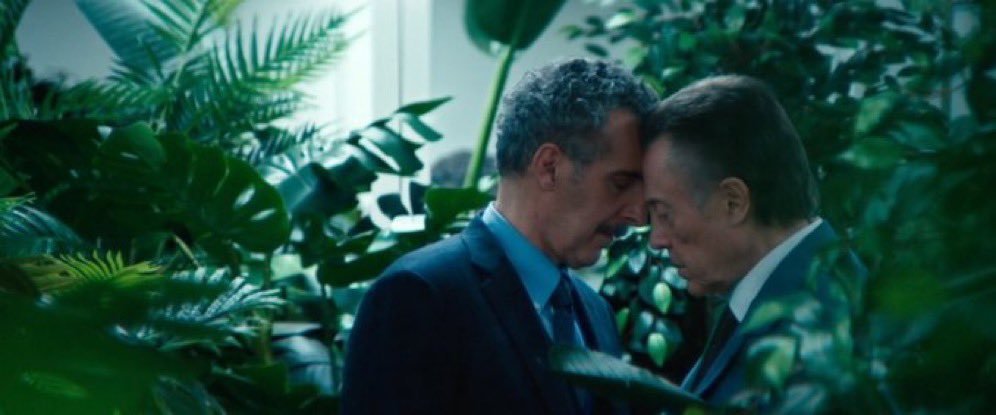Why this is interesting: Severance is an allegory for how we try and fail to separate our work lives from our home lives. It’s also an allegory for the danger of keeping ourselves separate from the world we depend on.
Severance, a show on Apple TV+, revolves around four co-workers at the mysterious Lumon Industries. In episode one, we learn that they’ve chosen to disconnect their work lives from their outside ones. Surgically.
Work belongs to their Innie, life belongs to their Outie. By putting a neurological break between their two selves, the characters appear to have found the work-life balance that many of us crave.
At the end of the work day, their Innie relinquishes everything they know about their peculiar job, their colleagues, and their office. Their work never leaves.
And anything their Innie wants to know about their Outie arrives filtered, imparted through the soothing, detatched tones of Lumon’s management. The distractions of the outside world never intrude.
But as the story develops, a darker theme emerges: the benefit of this disconnection might instead belong to Lumon, not their employees.
The Bell Labs building, designed by Eero Saarinen and used as the setting for Lumon Enterprises’ headquarters
Lumon’s headquarters are set in the iconic, Eero Saarinen-designed Bell Labs building in Holmdel, New Jersey. It’s architecture that protects the secrets within, and keeps prying minds out.
Surrounded by a moat of car park, the building is Lumon's fortress against independent thought.
But the fortress is eventually breached. Tiny snippets of the outside world get past the gatekeepers. Inside and outside start to mingle in chaotic ways. Staff, once preoccupied with internal competition and interdepartmental intrigue, begin to realise they might be part of something bigger, darker, and more malevolent.
And on contact with uncomfortable truths, Lumon's lore — rich in benevolence and heroic acts — starts to crumble. Before long, the floodgates open and the horror of the co-workers’ predicament is revealed.
By the end of season one, our protagonists — with first-hand experience of the outside world — might just blow the whole thing open.
Now I’m not here to suggest that car companies are like Lumon, but when it comes to keeping the outside out, and the inside in, the parallels are hard to ignore.
Within the studio walls, behind the factory gates, it’s safe.
The outside world doesn't intrude and we work in splendid isolation, surrounded by folk like us, under the shroud of a storied brand that has survived world wars, oil crises, and the collapse of governments.
It’s easy to believe that things will continue as they always have.
Sure, the technology may change, we reassure ourselves, but the magic of manufacturing cars by the hundred thousand will stay the same. And besides, when we look over our shoulders at the competition, we see them beavering away on the same stuff as us.
There’s safety in numbers, and safety in isolation.
A little while back, the global urban population surpassed 50%, and by 2100, two-thirds or even three-quarters of folk will be living in cities. Why? I’ll let Horace Dediu explain:
“The reason cities are popular is that they are where opportunities lie. And opportunities lie in cities because opportunities today come from collaboration and specialization. We build things with help from others.“
From cities, new ideas and atitudes emerge, businesses forge new models for creating value, and we imagine new ways of using and sharing space.
Living in cities, we benefit from our proximity to others.
We solve problems far faster and with a greater degree of collective benefit than if we remain isolated from our kin.
We learn from and adapt to a rapidly evolving environment.
From cities, the future springs.
The GM Tech Center in Warren, MI, designed by Eero Saarinen
But whether it’s Torslanda or Sindolfingen, Whitely or Warren, the headquarters of the automotive industry are found on the fringes.
These nerve centres are disconnected from where the future happens, and automotive companies are disconnected from their relationship with the wider world — the people, the culture, and the ecosystems — they impact.
Behind the factory gates, and within the studio walls, it's hard to get a feel for what's going on, and what the world needs.
And what is the creation of a meaningful product or service, if not capturing a collective feeling and meeting a universal need?
A scene from Severance
As Lumon's employees reconnect with the outside world, they reconnect with themselves, and the roles they want to play.
They share their experiences with their colleagues and together they imagine new ways of escaping their current predicament.
They shift from thinking about doing things right -- as they are told to do, and as they always have -- to questioning whether they're doing the right thing.
They question the status quo and begin to create a better future.
As people responsible for the future of the automotive industry, we need to reconnect with the outside world, too.
We need to acquaint ourselves with the ecosystems of which we are a part, and on which we depend.
We need to connect with with those that we serve, not just our customers, but their communities and cultures, too.
And, based on what we learn, we need to redefine the role that we and our organisations want to play.
Do we want to perpetuate the status quo, as we are currently doing?
Or do we want to create a better future?



